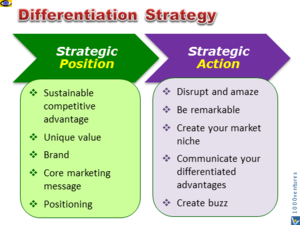Differentiation Strategy
Differentiation Strategy is the strategy that aims to distinguish a product or service, from other similar products, offered by the competitors in the market. It entails development of a product or service, that is unique for the customers, in terms of product design, features, brand image, quality, or customer service. Differentiation strategy is one of three Porter’s Generic Strategies.[1]
Differentiation is the key to successful marketing, competing, and building your sustainable competitive advantage. A superior product or service means nothing without a way of somehow letting your prospective customers know about it. Your differentness can be any customer benefit that separates you from your competitors. You must find that difference and communicate it to your customer.

source: 1000Ventures
Advantages of Differentiation Strategy
Potential Benefits of A Differentiation Strategy[2]
Differentiation relies on the concept that customers will pay more for an item if they perceive that it is different and if the basis for the difference is valued by the customer.
Differentiation involves achieving competitive advantage through pinpointing product or service attributes that customers perceive as valuable and positioning the firm to meet those demands betters than the competition. It refers to -
"...creating something that is perceived industrywide as being unique. Approaches to differentiating can take many forms: design or brand image, Information Technology (IT)|technology, (...) features, customer service, dealer network, or other dimensions" (Michael E. Porter ).
Differentiation has several potential advantages:
- Differentiation provides insulation against competitive rivalry because of brand loyalty by customers and resulting lower sensitivity to price.
- It increases margins, which avoids the need for a low-cost position.
- It can provide entry barriers for competitors as a result of customer loyalty and the need for a competitor to overcome the product or service uniqueness.
- Differentiation yields higher margins with which to deal with supplier power.
- It can mitigate buyer power because there are no comparable alternatives.
- The firm that has differentiated itself to achieve customer loyalty should be better positioned vis-a-vis substitutes than its competitors.
See Also
References
- ↑ Definition: What is Differentiation Strategy? Business Jargons
- ↑ What are the Potential Benefits of A Differentiation Strategy? Strategy Formulation
